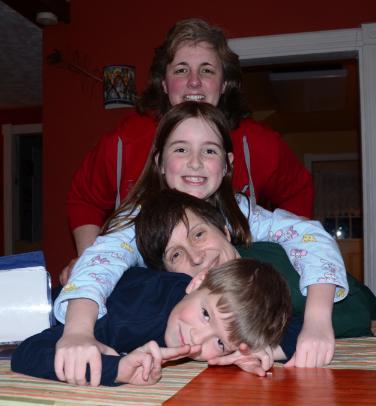UPDATE: March 12 – The Peterborough Victoria Northumberland Clarington Catholic District School Board (PVNCCDSB) will take another look at the wording of an equity pamphlet that describes homosexuality as “disordered.”
PVNCCDSB spokesperson Nancy Sharp says the equity and inclusive education committee will review the booklet and make recommendations before sending it back to trustees for a final say.
The equity committee meeting, which is open to the public, meets March 29 at 6:30pm at the Catholic Education Centre at 1355 Lansdowne St in Peterborough. From there, the pamphlet will appear on the agenda of the April board meeting, Sharp says. “The equity committee will produce recommendations that will go to board.”
Ann Michelle Tesluk, a gay Catholic mom in Bowmanville who first complained about the pamphlet, hopes the board decides to remove the quote from the Catholic catechism, which she calls “a dangerous message” to teach children.
Ontario parents object to language in new equity pamphlet
Feb 29 – A gay Catholic mom in Bowmanville says she doesn’t want her children to be taught that she is “disordered” — a word used to describe gay people in a new Catholic school board equity pamphlet.
Ann Michelle Tesluk wants her local Catholic board to remove this controversial passage from the pamphlet, which will soon be distributed to students.
Tesluk’s two children attend St Joseph Catholic Elementary School, part of the Peterborough Victoria Northumberland Clarington Catholic District School Board (PVNCCDSB).
The 28-page “Colour of Equity” pamphlet, which was recently presented to the school’s parent council, is a colourful and visual explanation of the board’s equity and inclusive education policy, which Tesluk says is by and large a positive step in the right direction.
But Tesluk, who is in a same-sex relationship, says she is very uncomfortable with the language used to discuss sexual orientation.
The pamphlet quotes the Catholic Catechism, something Tesluk says is problematic, especially a passage that says, “The number of men and women who have deep-seated homosexual tendencies is not negligible. This inclination, which is objectively disordered, constitutes for most of them a trial. They must be accepted with respect, compassion, and sensitivity. Every sign of unjust discrimination in their regard should be avoided.”
Tesluk says calling gay people disordered “is not in line with modern thinking.” She says that for young children and teenagers at risk of bullying, it’s a dangerous message that puts queer students at greater risk.
“It tells them that being gay is the same as being emotionally and mentally disturbed. It says to students they should be ashamed of who they are,” she says. “I pointed out that the wording is not only insulting, but also incorrect. I don’t think the pamphlet is appropriate the way it is now.
“I don’t expect the Catholic Church to change overnight, but it’s wrong to teach that to children. It’s not factual. It’s not based in any kind of scientific research, and it does a lot of harm,” she says.
PVNCCDSB education director Greg Reeves says the passage is fundamentally important to the Catholic religion.
“From the Catholic perspective, a relationship that isn’t procreative, or does not produce the conception of children, is disordered,” he says. “It doesn’t matter what the relationship is, homosexual or heterosexual; if it is not procreative, the relationship is disordered in the eyes of the Catholic Church.”
Reeves says Catholic schools promote chastity for all students, gay or straight.
Despite its problems, Tesluk says overall the pamphlet is a positive step forward. She wants the board to be brave and progressive by removing the quote from the Catholic Catechism. “There is a lot of good stuff in this document, but that part is not good. There is no reason to have that in there.”
Other parts of the document are more progressive, discussing First Nations people, white privilege, gender identity, economic status and ageism.
The “White Privilege” section states that “23 percent of those living in Canada incorrectly believe that some races are genetically smarter than others. In Canada, members of racialized groups earn 28 percent less than whites.”
See the “Colour of Equity” pamphlet here.

 Why you can trust Xtra
Why you can trust Xtra


